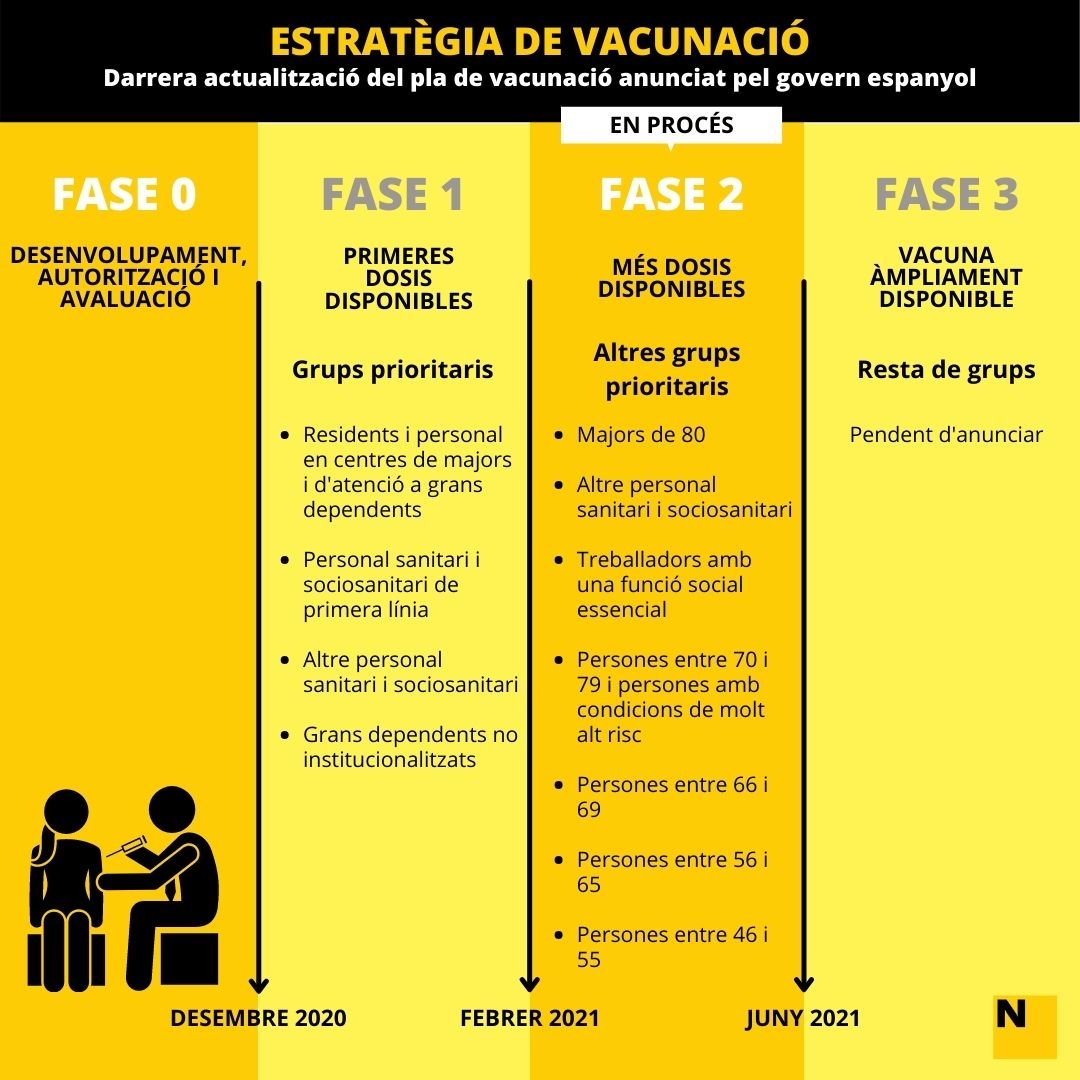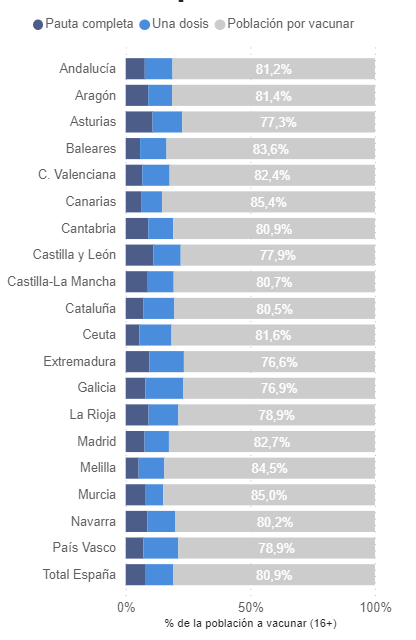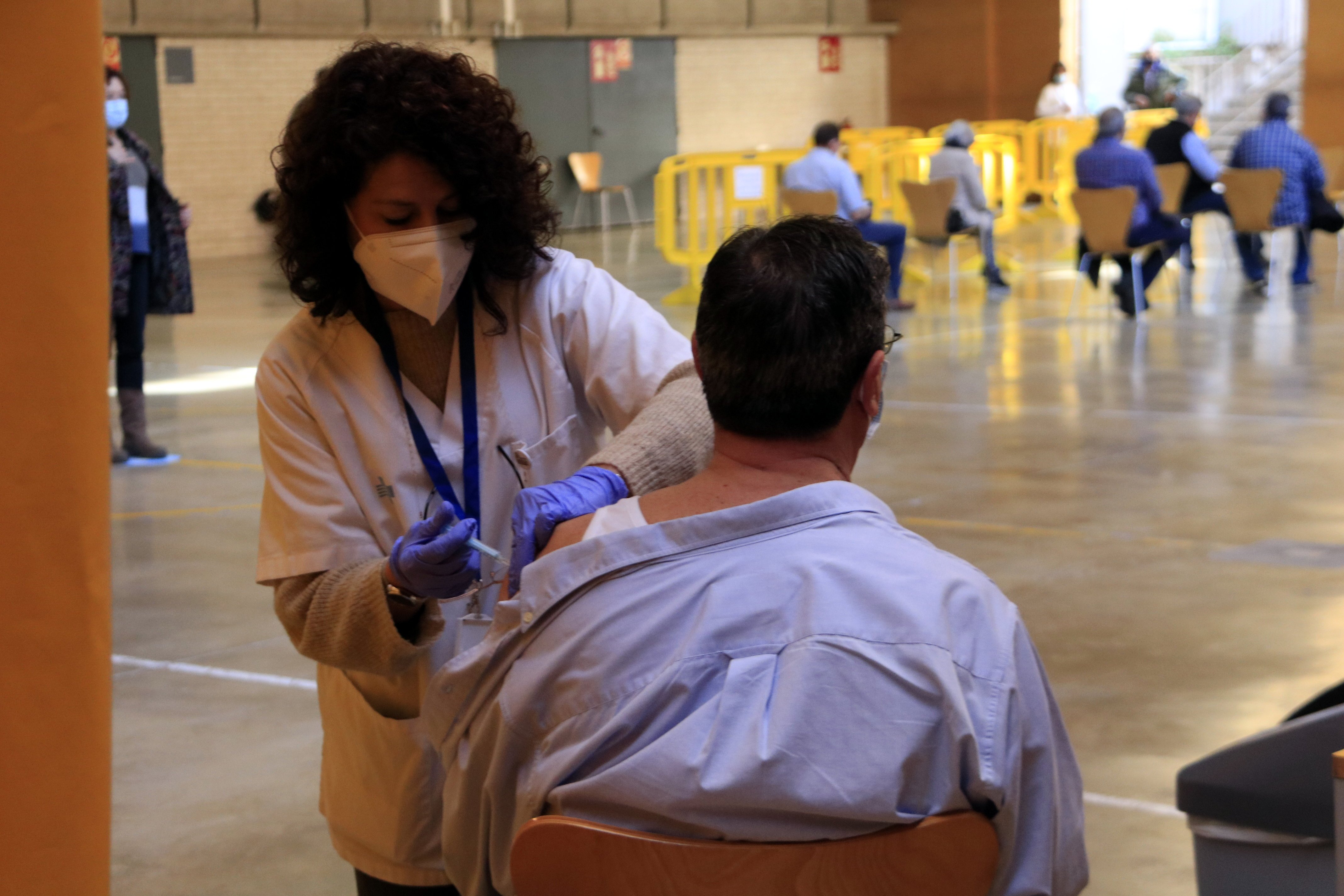The calendar for the Covid vaccination schedule - in Catalonia and throughout the Spanish state - is subject to constant changes. The main reasons for this uncertainty are the delays in the vaccine batch deliveries after they have been agreed in Brussels, but there are other factors as well. One such case has emerged this week: Janssen is temporarily halting the distribution of its Covid-19 vaccine in Europe. The decision comes after the US Food and Drug Administration decided to immediately suspend the administration of this vaccine following cases of thrombosis.
Anomalies like the Janssen one and the earlier changes of policy affecting AstraZeneca, have upset vaccine shot appointments already made; and, at a wider level, the strategies that each Spanish autonomous community applies have had to continue adapting to the official vaccination model set down by the Spanish state.
However, despite the changes, there is a strategy behind it all, with Spanish prime minister, Pedro Sánchez, recently updating overall objectives: that at the end of August, 70% of the Spanish population will be immunized thanks to "the largest global vaccination campaign in history in an unprecedented effort ". According to official data, the vaccination process in Spain has already reached 94.6% of those aged 80 and over.
To know when you will be vaccinated, you have to take into account three essential factors: your age, the professional field to which you belong and whether you are affected by any medical condition that could affect the consequences of being infected with coronavirus. With these premises, a calendar of estimated phases has been drawn up by the Spanish health ministry, which sets out in broad terms the months corresponding to each profile for members of the Spanish public. There are three general phases of vaccine supply and we are now in the second, although work is still dragging on from the first - the completion of the vaccine shots for those over 80 - but new age groups are being incorporated. In June, the announcement of the last stage is expected.

Latest update of the vaccination strategy announced by the Spanish government / Source: Spanish Ministry of Health
Calendar by ages and professional sectors
People over the age of 80, born in 1941 or before:
At present, the Spanish health ministry considers that "the vaccination of the groups initially prioritized in the first stage has been completed", although this is not the case. People aged 80 and over have been vaccinated with Pfizer/BionTech and Moderna. But specific professional sectors have also been prioritized: those in residential homes for the elderly, and health and socio-health personnel working in such homes and in care for the elderly; front-line staff in the health and socio-health field and other health and socio-health staff (not included in the previous group) who carry out activities that require close contact with people who may be infected. Also vaccinated are dental and dental hygiene staff and those who attend to people without masks for more than 15 minutes.
As well, people who are classified as "highly dependent" have been included in the first phase - that is, those with Grade III dependency, which means they require intense, non-institutionalized support measures. In parallel, AstraZeneca shots have been administered, and continue to be, to staff of the public health services involved in the management and response to the pandemic, previously-unvaccinated health and social and health personnel, including health inspection services, legal and forensic medicine, private medical clinics, home help services, residential centres for youths, and day centres or equivalent, as well as health and socio-health students in clinical internships.
Physiotherapists and occupational therapists, pharmacy staff, dental prosthetists, speech therapists, and clinical psychology staff; workers in penitentiary institutions; active groups with an essential function for society such as security forces and bodies, emergency and armed forces, including the Civil Guard, National Police, autonomous and local police, firefighters, technicians in the security forces, professionals in civil protection and emergency services; teachers and staff of early childhood education and special educational needs. In the case of the armed forces, the Spanish defence minister, Margarita Robles, diverted a batch of Pfizer vaccines that did not correspond to the military. The Junts political party has asked for an explanation in the Senate.
People between 70 and 79 years old, born from 1942 to 1951, both of these years included:
It is expected to have this age groups immunized between April and June. The doses are planned to be from Moderna and Janssen. Also to be taken into account in this phase will people with very high risk conditions aged from 16-18 years upwards. This group includes: those who have hematopoietic progenitor transplants, solid organ transplants or are on the waiting list for organ transplants, those under kidney replacement treatment, suffering from oncohematological disease, cancer of an organ in treatment with cytotoxic or metastatic chemotherapy, or radiotherapy for thoracic tumours at risk of pneumonitis, those with primary immunodeficiencies, those infected with HIV with less than 200 cells/ml despite effective ART and undetectable viral load, as well as people with Down syndrome over 40 years of age.
People with these latter conditions will receive the vaccine that is available depending on the context of the pandemic and evidence on its effective use. The Pfizer vaccine is authorized from the age of 16 and the Moderna, AstraZeneca and Janssen vaccines from the age of 18.
People between 66 and 69 years old, born between 1952 and 1955, both included:
Although the Spanish government has extended this age group downwards to 60 years, but we divide it in two, taking into account the criteria used in Catalonia, where another subgroup has been created for the under-66s. Within this group, Catalans aged 69 can now book a Covid jab, in this case the Oxford-AstraZeneca vaccine, following a specific announcement this week by the Catalan health ministry, only for those aged 69.
People between 65 and 56 years old, born between 1956 and 1965, both included:
The administration of AstraZeneca has been limited by age group, both in Catalonia and in other autonomous communities. This has meant that currently, Catalans from 60-65 are able to book Covid shots. This age range has jumped ahead of the cohort immediately above and a sector has already received a first dose. To register and receive the first, the La Meva Salut portal can be used in Catalonia.
People between 46 and 55 years old, born between 1966 and 1975, both included:
These will be the last to be included in the second phase of vaccination by the Spanish government and, therefore, at the beginning of the summer they should have received at least the first dose - that is, by the end of June.
At the moment, those corresponding to the professional groups mentioned above are being vaccinated with AstraZeneca vaccine. However, as the above groups complete their immunization, professional people in this group will receive the vaccine that is considered based on availability, the context of the pandemic, and the evidence. That is, they could also receive Pfizer, Moderna or Janssen and be immunized within three to four months, between July and August.
People under 46:
This third and final stage has not yet been marked or divided by age groups. There is only the announcement by Sánchez about the total number of immunized population at the end of August. Considering that vaccination of 70% of the population is envisaged - that is, 33 million people before the end of the summer - this age group would also enter the process. Vaccinations may be administered for the next group down - those from 35 to 45, and from September, for those between the ages of 18 and 34. However, this division is is a possibility foreseen by experts but not yet confirmed.
On-line date calculators have been created, not endorsed by the Spanish health ministry, which take these likely schedules into account. The most prominent is OMNI Calculator, created by two physics and medical students, Álvaro Díez and Dominica Miszewska.
It should be borne in mind that in addition to Moderna, Pfizer, AstraZeneca and Janssen, two more vaccines could also be introduced shortly: Novavax and Curevac.
Vaccinated population
Between December 27th, 2020 and April 12th, 10,784,997 Spaniards were vaccinated. Of the total, 28.82% have already received two doses, and the vaccine receievd by most is that of Pfizer, at 64.34%; followed by AstraZeneca, 26.94%, and Moderna by 8.70%. Catalonia is in lower-to-middle part of table in terms of vaccination rates, with 462,795 citizens vaccinated completely.

Table of population vaccinated by Spanish autonomous communities / Source: Spanish health ministry
Main photo: A nurse vaccinates a care home resident in Sant Boi de Llobregat this March.

